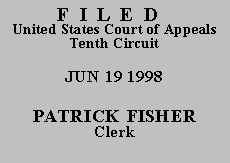

| DERRICK DENNIS LANE,
v.
HAROLD NYE and CARLA J.
STOVALL, Attorney General for the
State of Kansas |
|
Before SEYMOUR, BRORBY, and BRISCOE, Circuit Judges.
After examining the brief(s) and appellate record, this panel has determined unanimously that oral argument would not materially assist the determination of this appeal. See Fed. R. App. P. 34(a); 10th Cir. R. 34.1.9. The case is therefore ordered submitted without oral argument.
Mr. Derrick Lane appeals the district court's denial of his petition for writ of habeas corpus under 28 U.S.C. § 2254. He also requests a certificate of appealability, a prerequisite to our jurisdiction over his appeal. 28 U.S.C. § 2253(c). The district court denied Mr. Lane's certificate of appealability. Mr. Lane claims the retroactivity provision of the Kansas Sentencing Guidelines Act, Kan. Stat. Ann. § 21-4724(b)(1) (1995), violates his due process and equal protection rights under Fourteenth Amendment of the United States Constitution. Section 21-4724(b)(1) limits retroactive application of the Guidelines to certain classes of offenders, thereby excluding Mr. Lane. Kan. Stat. Ann. § 21-4724(b)(1). Mr. Lane argues all offenders sentenced prior to July 1, 1993, the effective date of the Guidelines Act, should be afforded retroactive application of the Guidelines.
Both the Kansas Supreme Court and the federal district court have addressed and rejected similar arguments. See Chiles v. State, 869 P.2d 707 (Kan.), cert denied, 513 U.S. 850 (1994); Jones v. Bruce, 921 F. Supp. 708 (D. Kan. 1996). Mr. Lane's case is indistinguishable. Therefore, for the reasons set forth in those cases, we conclude Mr. Lane has not suffered a constitutional violation. Consequently, we DENY Mr. Lane's application for a certificate of appealability because he has failed to make a "substantial showing of the denial of a constitutional right," 28 U.S.C. § 2253(c)(2), and DISMISS his appeal.
Entered by the Court:
WADE BRORBY
United States Circuit Judge
*. This order and judgment is not binding precedent except under the doctrines of law of the case, res judicata and collateral estoppel. The court generally disfavors the citation of orders and judgments; nevertheless, an order and judgment may be cited under the terms and conditions of 10th Cir. R. 36.3.